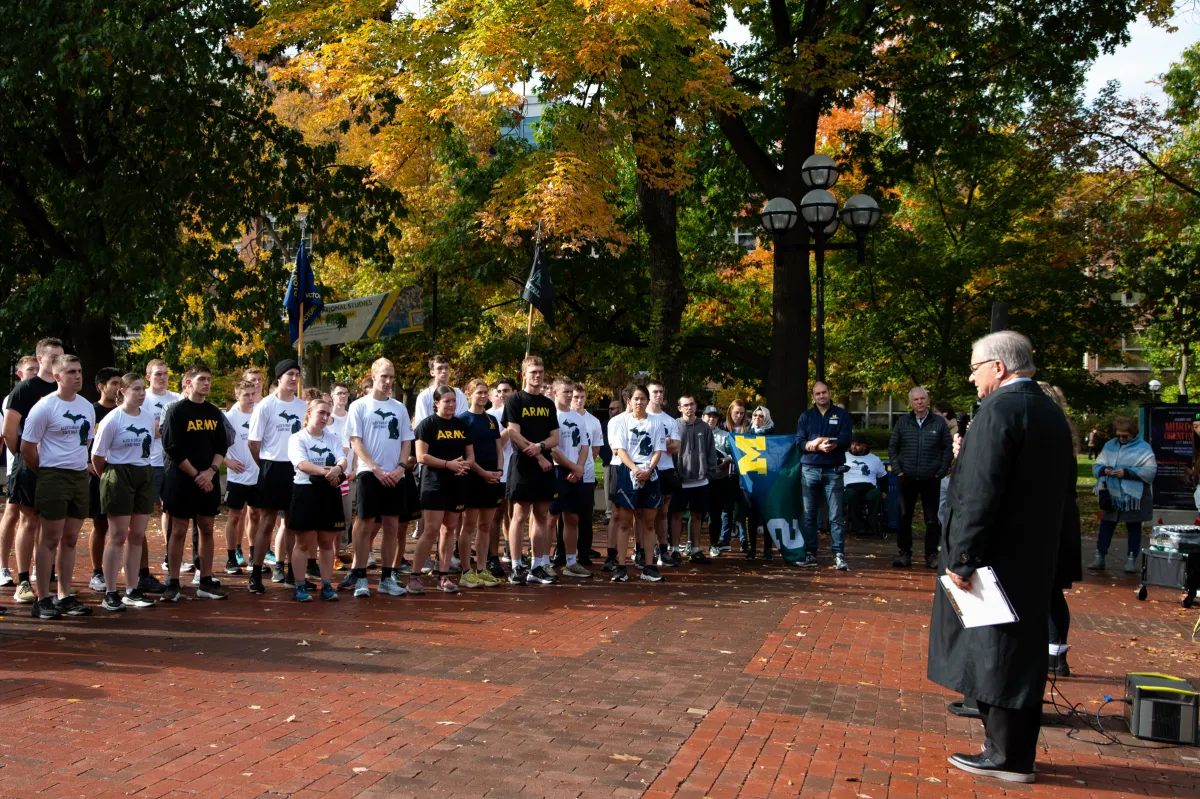UMich and MSU ROTC students run 64 miles in annual fundraiser before rivalry football game
About 50 students in the University of Michigan and Michigan State University ROTC program completed a 64-mile backroad trek Friday morning as part of the 11th annual Alex’s Great State Race. The race occurs every year on the Friday before the Saturday rivalry football game between MSU and the University. Cadets from both schools run the game-day ball from one campus to the other each year.
Alex’s Great State Race honors the memory of Alex Powell, a former MSU student who lost his life from a rare form of aggressive cancer. While Powell was battling cancer, he was able to continue his education due to support he received from the Michigan State Resource Center for Persons with Disabilities while receiving cancer treatment at Michigan Medicine. The annual race serves as a fundraiser for the Resource Center for Persons with Disabilities at MSU and the U-M Students Accessibility and Accommodations Services, which is housed in the Services for Students with Disabilities office.
The race had an early morning start, with runners taking off at 1 a.m. in East Lansing. Participants finished at approximately 12 p.m. in Ann Arbor. There were security measures, inlcuding flashers for runners to see the course and signs that read “Runners on road ahead,” in place to maintain the safety of the runners throughout the 11-hour course.
Richard Bernstein, Michigan Supreme Court justice, joined the runners at the five-mile mark, and students from the U-M Adaptive Sports & Fitness teams joined the group in the last mile of the run.
In an interview with The Michigan Daily, Alex’s mother Juliana Powell shared her inspiration for creating the event and her desire to give back to the programs that supported Alex during his battle with cancer. She explained how the race raises money for the two school’s accessibility programs.
“After Alex’s passing, I just wanted to find a way to give back, and it was an easy thing to want to give back to the University here, as well as back home at East Lansing,” Powell said. “We’re raising money for both (schools). We have two fully endowed scholarships at both schools now that help students who need assistance.”
Louis Goldstein, captain and assistant professor of military science in the Wolverine Battalion, told The Daily that ROTC members volunteered to run the 64-mile trail. He also spoke about how this event is tied to broader goals and values of military service.
“Military service isn’t just pulling a trigger or what some of those connotations are,” Goldstein said. “We’re here because of the service orientation that service can be. We’re here for the community.”
Public Policy junior Samuel Roberts highlighted the unique collaboration between military programs and civilians during the overnight trek.
“This isn’t about us,” Roberts said. “It’s about somebody who has lost to cancer, it’s about charity. It’s one of the few times when military organizations can come together for a nonmilitary cause, showing solidarity with military to civilian and also ROTC program to ROTC program. Doing something that’s really difficult and unusual, especially during a big rivalry, has a lot of meaning to it.”
Kinesiology junior Maria Velat, an athlete on the U-M wheelchair tennis and wheelchair track teams, participated in the final mile.
“Seeing all the people willing to come out to help people with disabilities, there’s a lot of people with physical and hidden disabilities that you don’t really acknowledge a lot, and it’s nice to see that people care and they want to help, and just the passion that people have for it,” Velat said.
Anya Cobler, stewardship program coordinator of SAAS, told The Daily about the center’s mission to provide students who need accommodations with the support they need.
“We work to make sure students with disabilities on the campus have access to the services they need, to their classes, to extracurriculars and really envision a world where disability is seen not as something to be a stigma,” Cobler said.
In an interview with The Daily, Will Tieman, president of WGHN Radio and Spartan Sports Network, reflected on how sports events can spotlight meaningful causes like Alex’s Great State Race.
“The one thing sport can do for all of us (is) it can be a platform to bring attention to things that are really important,” Tieman said “We applaud those people who will give their best efforts … (at the game), but we’re also applauding today the people who have challenges, who get up every day and they refuse to let their obstacles be a problem.”
Daily Staff Reporter Elizabeth Stafford can be reached at libstaf@umich.edu.
